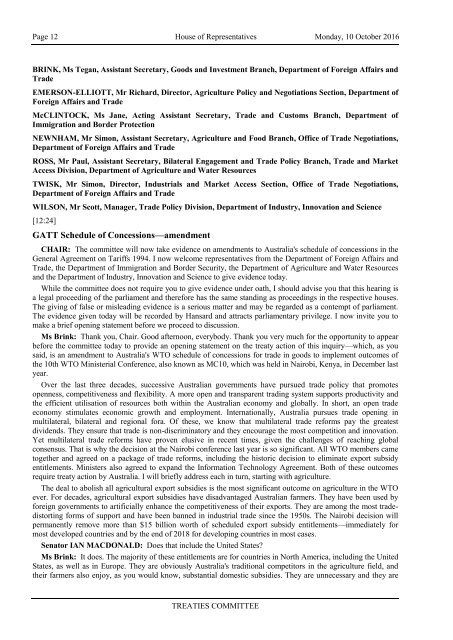Proof Committee Hansard
2d908Ic
2d908Ic
You also want an ePaper? Increase the reach of your titles
YUMPU automatically turns print PDFs into web optimized ePapers that Google loves.
Page 12 House of Representatives Monday, 10 October 2016<br />
BRINK, Ms Tegan, Assistant Secretary, Goods and Investment Branch, Department of Foreign Affairs and<br />
Trade<br />
EMERSON-ELLIOTT, Mr Richard, Director, Agriculture Policy and Negotiations Section, Department of<br />
Foreign Affairs and Trade<br />
McCLINTOCK, Ms Jane, Acting Assistant Secretary, Trade and Customs Branch, Department of<br />
Immigration and Border Protection<br />
NEWNHAM, Mr Simon, Assistant Secretary, Agriculture and Food Branch, Office of Trade Negotiations,<br />
Department of Foreign Affairs and Trade<br />
ROSS, Mr Paul, Assistant Secretary, Bilateral Engagement and Trade Policy Branch, Trade and Market<br />
Access Division, Department of Agriculture and Water Resources<br />
TWISK, Mr Simon, Director, Industrials and Market Access Section, Office of Trade Negotiations,<br />
Department of Foreign Affairs and Trade<br />
WILSON, Mr Scott, Manager, Trade Policy Division, Department of Industry, Innovation and Science<br />
[12:24]<br />
GATT Schedule of Concessions—amendment<br />
CHAIR: The committee will now take evidence on amendments to Australia's schedule of concessions in the<br />
General Agreement on Tariffs 1994. I now welcome representatives from the Department of Foreign Affairs and<br />
Trade, the Department of Immigration and Border Security, the Department of Agriculture and Water Resources<br />
and the Department of Industry, Innovation and Science to give evidence today.<br />
While the committee does not require you to give evidence under oath, I should advise you that this hearing is<br />
a legal proceeding of the parliament and therefore has the same standing as proceedings in the respective houses.<br />
The giving of false or misleading evidence is a serious matter and may be regarded as a contempt of parliament.<br />
The evidence given today will be recorded by <strong>Hansard</strong> and attracts parliamentary privilege. I now invite you to<br />
make a brief opening statement before we proceed to discussion.<br />
Ms Brink: Thank you, Chair. Good afternoon, everybody. Thank you very much for the opportunity to appear<br />
before the committee today to provide an opening statement on the treaty action of this inquiry—which, as you<br />
said, is an amendment to Australia's WTO schedule of concessions for trade in goods to implement outcomes of<br />
the 10th WTO Ministerial Conference, also known as MC10, which was held in Nairobi, Kenya, in December last<br />
year.<br />
Over the last three decades, successive Australian governments have pursued trade policy that promotes<br />
openness, competitiveness and flexibility. A more open and transparent trading system supports productivity and<br />
the efficient utilisation of resources both within the Australian economy and globally. In short, an open trade<br />
economy stimulates economic growth and employment. Internationally, Australia pursues trade opening in<br />
multilateral, bilateral and regional fora. Of these, we know that multilateral trade reforms pay the greatest<br />
dividends. They ensure that trade is non-discriminatory and they encourage the most competition and innovation.<br />
Yet multilateral trade reforms have proven elusive in recent times, given the challenges of reaching global<br />
consensus. That is why the decision at the Nairobi conference last year is so significant. All WTO members came<br />
together and agreed on a package of trade reforms, including the historic decision to eliminate export subsidy<br />
entitlements. Ministers also agreed to expand the Information Technology Agreement. Both of these outcomes<br />
require treaty action by Australia. I will briefly address each in turn, starting with agriculture.<br />
The deal to abolish all agricultural export subsidies is the most significant outcome on agriculture in the WTO<br />
ever. For decades, agricultural export subsidies have disadvantaged Australian farmers. They have been used by<br />
foreign governments to artificially enhance the competitiveness of their exports. They are among the most tradedistorting<br />
forms of support and have been banned in industrial trade since the 1950s. The Nairobi decision will<br />
permanently remove more than $15 billion worth of scheduled export subsidy entitlements—immediately for<br />
most developed countries and by the end of 2018 for developing countries in most cases.<br />
Senator IAN MACDONALD: Does that include the United States?<br />
Ms Brink: It does. The majority of these entitlements are for countries in North America, including the United<br />
States, as well as in Europe. They are obviously Australia's traditional competitors in the agriculture field, and<br />
their farmers also enjoy, as you would know, substantial domestic subsidies. They are unnecessary and they are<br />
TREATIES COMMITTEE















